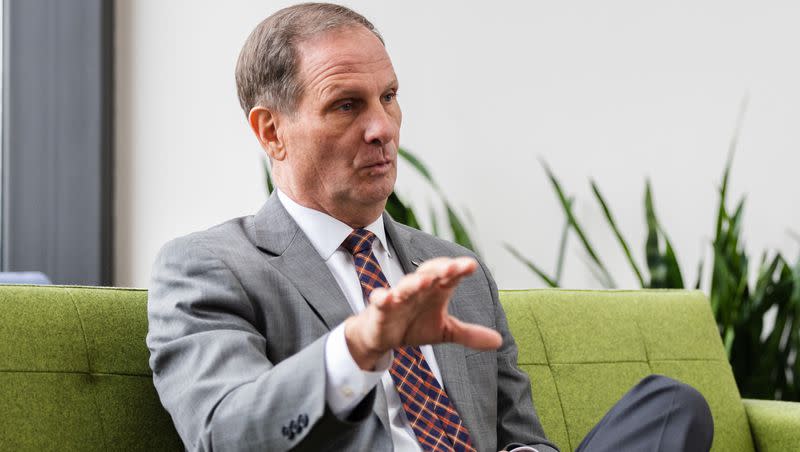Opinion: The candidates have filed. Who is running for Chris Stewart’s House seat?

- Oops!Something went wrong.Please try again later.
Pignanelli & Webb: Utah is experiencing an abnormally cool June. But unpredictable events are ensuring unusually hot politics this summer. We throw some charcoal briquettes into the heated deliberations. (Yes, we do like those corny metaphors.)
After 2nd District Congressman Chris Stewart submitted his official letter of resignation, Gov. Spencer Cox called a June 14 special legislative session, and lawmakers finalized the details of the special election to replace Stewart. In unprecedented action, they moved the municipal primary election from Aug. 15 to Sept. 5 and the municipal general election from Nov. 5 to Nov. 21. This allows the congressional special election to occur simultaneously with the municipal elections. Why did they do this, and what are the impacts?
”Tradition is a guide and not a jailer.” — W. Somerset Maugham
Wars, pestilence and economic distress did not disrupt prior elections. Utahns are affected daily by their local elected officials (public safety, traffic, garbage, etc.) and much less by representatives in Washington, D.C. But the desire to avoid a lengthy period without 2nd District representation flipped this priority. So please excuse us mature political veterans (aka old duffers) who find this changing of election days to be weird stuff.
Of course, the external pressures on state officials demand some understanding. Federal laws require those serving in the Armed Forces an opportunity to vote in these elections, which expands the timelines. But what really determined the outcome was the signature gathering process, which requires extra time. If political parties were allowed to select their nominees only in a convention or in a truncated primary, then the process would be more manageable.
This dilemma fostered recommendations from several lawmakers to use the controversy as an opportunity to junk the signature gathering process. However, eliminating this route to the primary ballot in a special session with little deliberation would have caused a huge uproar — and would not be a good idea. Also, local officials in the 2nd District expressed concern that having two different balloting processes (congressional and municipal) at different times this year would be costly and confusing.
Related
Rep. Chris Stewart will resign his seat on Sept. 15, Gov. Cox announces special election dates
Here’s when Utahns will elect a replacement for Rep. Chris Stewart
Some municipal candidates are now frustrated because their campaigns are extended by two weeks into the Thanksgiving environment. This causes a rethinking of campaign strategies.
Politicos are musing how municipal races in the 2nd District will be impacted by the partisan special election. Strident Republicans and Democrats who usually ignore local contests may participate in higher numbers. Of particular interest is the infusion of GOP activists into the Salt Lake City mayoral race, usually dominated by left-wing voters. Some believe this development will incentivize a Republican to get in the mayoral race, especially because the city will be using ranked-choice voting. Shrewd mayoral candidates must now run a campaign that expands their coalition in hopes of capturing ballots from all affiliations.
The politics of 2023, nationally and locally, continues to offer surprises.
Twenty-two candidates filed to replace Congressman Stewart. Who will benefit from the unique dynamics of this special election?
Utahns seeking to replace Stewart cover the political spectrum and have varied backgrounds. Stewart captured 60% of the 2022 vote, indicating the eventual GOP nominee should have an easy path in the general election. Consequently, the Republican contenders are quite diverse. Former state lawmaker Becky Edwards is popular among moderate segments of the party. Former GOP State Chair and national committeeman Bruce Hough clearly enjoys significant institutional support. Celeste Maloy is a well-respected member of Stewart’s office, and Jordan Hess is the state GOP vice chair. The others, Scott Hatfield, Quin Denning, Remy Kush, Tyrone Jensen, Kathleen Anderson, Bill Hoster, Scott Reber and Henry Christian Eyring, are less well known, but have their respective bases.
The one fundamental element they all share is the need for a strategy to contend with a fellow candidate — former Speaker of the House Greg Hughes, clearly a top competitor in the contest. Special elections are unique in that they are short, condensed affairs that favor candidates with higher name recognition and highly engaged supporters. Hughes, beloved among Utah Trumpistas and the more libertarian minded, is built for such a campaign. In the 2020 gubernatorial primary, he won many of the southern counties inside the 2nd District. This is a major advantage for Hughes, as the more centrist candidates will divide primary votes.
On the Democratic side, State Sen. Kathleen Riebe has an advantage against her opponents Archie Williams and Guy Warner. She has name identification and support among traditional organizations, especially education and social activist groups.
The party conventions will nominate just one person to appear on the Sept. 5 primary ballot. Five Republicans are hoping to submit the required signatures by July 5 to also be on the primary ballot. As with the 2020 gubernatorial primary election, the winner may be decided by less than a majority.
When Stewart announced his early retirement, it became immediately apparent that the special election structure developed in 2020 was impractical. This necessitated the June special session. Will the new legislative tweaks provide some consistency?
Future special election processes and dates will all depend on when vacancies occur. Thus, the special election legislation passed in the recent special session is unique to 2023. This issue will be revisited.
Republican LaVarr Webb is a former journalist and a semiretired small farmer and political consultant. Email: lwebb@exoro.com. Frank Pignanelli is a Salt Lake attorney, lobbyist and political adviser who served as a Democrat in the Utah state Legislature. Email: frankp@xmission.com.

